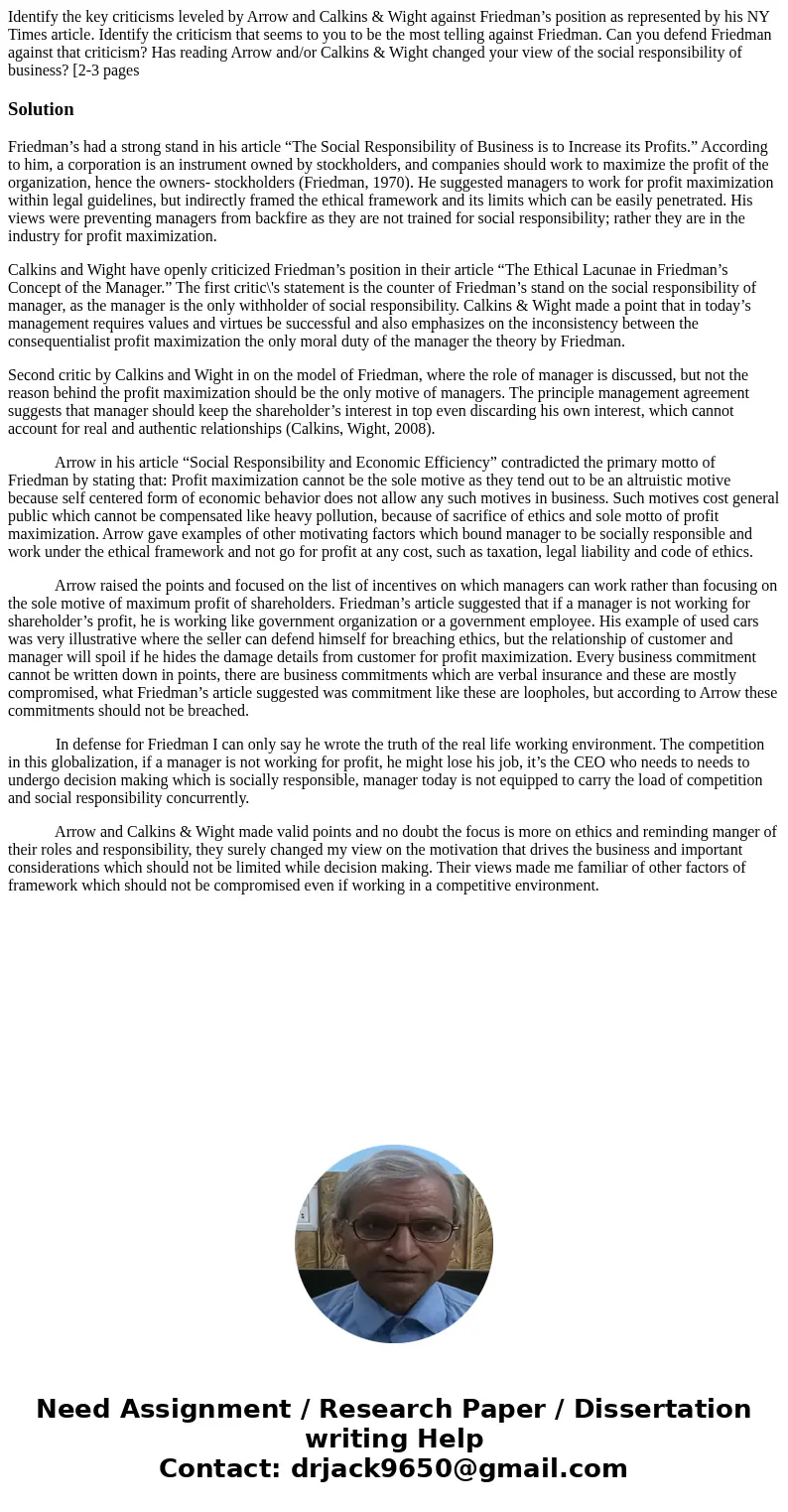Identify the key criticisms leveled by Arrow and Calkins Wi
Identify the key criticisms leveled by Arrow and Calkins & Wight against Friedman’s position as represented by his NY Times article. Identify the criticism that seems to you to be the most telling against Friedman. Can you defend Friedman against that criticism? Has reading Arrow and/or Calkins & Wight changed your view of the social responsibility of business? [2-3 pages
Solution
Friedman’s had a strong stand in his article “The Social Responsibility of Business is to Increase its Profits.” According to him, a corporation is an instrument owned by stockholders, and companies should work to maximize the profit of the organization, hence the owners- stockholders (Friedman, 1970). He suggested managers to work for profit maximization within legal guidelines, but indirectly framed the ethical framework and its limits which can be easily penetrated. His views were preventing managers from backfire as they are not trained for social responsibility; rather they are in the industry for profit maximization.
Calkins and Wight have openly criticized Friedman’s position in their article “The Ethical Lacunae in Friedman’s Concept of the Manager.” The first critic\'s statement is the counter of Friedman’s stand on the social responsibility of manager, as the manager is the only withholder of social responsibility. Calkins & Wight made a point that in today’s management requires values and virtues be successful and also emphasizes on the inconsistency between the consequentialist profit maximization the only moral duty of the manager the theory by Friedman.
Second critic by Calkins and Wight in on the model of Friedman, where the role of manager is discussed, but not the reason behind the profit maximization should be the only motive of managers. The principle management agreement suggests that manager should keep the shareholder’s interest in top even discarding his own interest, which cannot account for real and authentic relationships (Calkins, Wight, 2008).
Arrow in his article “Social Responsibility and Economic Efficiency” contradicted the primary motto of Friedman by stating that: Profit maximization cannot be the sole motive as they tend out to be an altruistic motive because self centered form of economic behavior does not allow any such motives in business. Such motives cost general public which cannot be compensated like heavy pollution, because of sacrifice of ethics and sole motto of profit maximization. Arrow gave examples of other motivating factors which bound manager to be socially responsible and work under the ethical framework and not go for profit at any cost, such as taxation, legal liability and code of ethics.
Arrow raised the points and focused on the list of incentives on which managers can work rather than focusing on the sole motive of maximum profit of shareholders. Friedman’s article suggested that if a manager is not working for shareholder’s profit, he is working like government organization or a government employee. His example of used cars was very illustrative where the seller can defend himself for breaching ethics, but the relationship of customer and manager will spoil if he hides the damage details from customer for profit maximization. Every business commitment cannot be written down in points, there are business commitments which are verbal insurance and these are mostly compromised, what Friedman’s article suggested was commitment like these are loopholes, but according to Arrow these commitments should not be breached.
In defense for Friedman I can only say he wrote the truth of the real life working environment. The competition in this globalization, if a manager is not working for profit, he might lose his job, it’s the CEO who needs to needs to undergo decision making which is socially responsible, manager today is not equipped to carry the load of competition and social responsibility concurrently.
Arrow and Calkins & Wight made valid points and no doubt the focus is more on ethics and reminding manger of their roles and responsibility, they surely changed my view on the motivation that drives the business and important considerations which should not be limited while decision making. Their views made me familiar of other factors of framework which should not be compromised even if working in a competitive environment.

 Homework Sourse
Homework Sourse